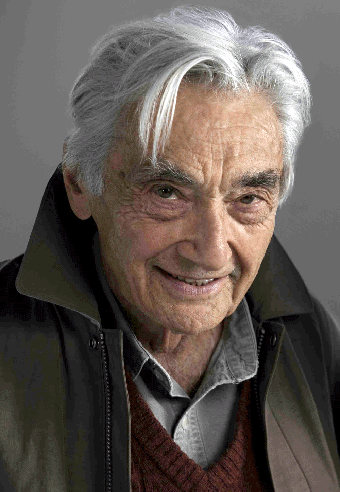Howard Zinn, an outspoken historian who influenced generations of leftist political activists, died of a heart attack Wednesday in California. He was 87.
The son of Jewish immigrants, Zinn reached a wide audience with his 1980 book A People’s History of the United States, which explored U.S. history through the lens of the experiences of dissidents, women, African Americans, Native Americans, immigrants, and laborers, rather than the conventional histories that emphasize the machinations of the wealthy and powerful.
 Howard Zinn, 1922-2010 Â Â Â Â Â Â Â Â Â Â Â Â Â Â Â Â Â Â Â Â Â Â Â Â Â Â Â Â Â Â Â Â Â Â Â Â Â Â Â (Photo: Steven Faulkner Moyer)
Howard Zinn, 1922-2010 Â Â Â Â Â Â Â Â Â Â Â Â Â Â Â Â Â Â Â Â Â Â Â Â Â Â Â Â Â Â Â Â Â Â Â Â Â Â Â (Photo: Steven Faulkner Moyer)
A People’s History had a first printing of 5,000, and subsequent editions pushed the number of copies in print past one million, according to press reports.
JTA noted that, along with Boston-based American Jewish professor, Noam Chomsky, “Zinn was a leading left-wing intellectual”:
“He’s made an amazing contribution to American intellectual and moral culture,” Chomsky said, according to the Boston Globe. “He’s changed the conscience of America in a highly constructive way. I really can’t think of anyone I can compare him to in this respect.”
According to the Wikipedia biography, Zinn was raised in a working-class family in Brooklyn, and flew bombing missions for the United States in World War II, an experience he now points to in shaping his opposition to war. In 1956, he became a professor at Spelman College in Atlanta, a school for black women, where he soon became involved in the Civil rights movement, which he participated in as an adviser to the Student Nonviolent Coordinating Committee (SNCC) and chronicled, in his book SNCC: The New Abolitionists. Zinn collaborated with historian Staughton Lynd and mentored a young student named Alice Walker [who later wrote The Color Purple]. When he was fired in 1963 for insubordination related to his protest work, he moved to Boston University, where he became a leading critic of the Vietnam War.
An Associated Press story that appeared in the New York Times noted that, at the age of 17, Zinn,  17, “urged on by some young Communists in his neighborhood,” attended a political rally in Times Square:
“Suddenly, I heard the sirens sound, and I looked around and saw the policemen on horses galloping into the crowd and beating people… I couldn’t believe that.”
“And then I was hit. I turned around and I was knocked unconscious. I woke up sometime later in a doorway, with Times Square quiet again, eerie, dreamlike, as if nothing had transpired. I was ferociously indignant.”
War continued his education. Eager to help wipe out the Nazis, he joined the Army Air Corps in 1943 and even persuaded the local draft board to let him mail his own induction notice. He flew missions throughout Europe, receiving an Air Medal, but he found himself questioning what it all meant. Back home, he gathered his medals and papers, put them in a folder and wrote on top: “Never again.”
He attended New York University and Columbia University, where he received a doctorate in history. In 1956, he was offered the chairmanship of the history and social sciences department at Spelman College, an all-black women’s school in segregated Atlanta.
During the civil rights movement, Professor Zinn encouraged his students to request books from the segregated public libraries and helped coordinate sit-ins at downtown cafeterias. He also published several articles, including a rare attack on the Kennedy administration, accusing it of being too slow to protect blacks.
Zinn appeared in St. Paul last April for a live performance of The People Speak, a theatrical and musical production based on Voices of a People’s History of the United States, by Zinn and Anthony Arnove.
There is also a documentary version, available on DVD, of The People Speak, featuring music by Eddie Vedder and performances by Viggo Mortensen, Sandra Oh, Sean Penn, Rosario Dawson, Don Cheadle, John Legend, and other renowned performers. — Mordecai Specktor









 Howard Zinn, 1922-2010 Â Â Â Â Â Â Â Â Â Â Â Â Â Â Â Â Â Â Â Â Â Â Â Â Â Â Â Â Â Â Â Â Â Â Â Â Â Â Â (Photo: Steven Faulkner Moyer)
Howard Zinn, 1922-2010 Â Â Â Â Â Â Â Â Â Â Â Â Â Â Â Â Â Â Â Â Â Â Â Â Â Â Â Â Â Â Â Â Â Â Â Â Â Â Â (Photo: Steven Faulkner Moyer)









